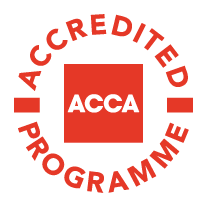Accounting
(BSc, 4 years)
Duration
4 years
Qualification Awarded
Bachelor of Science in Accounting
Level of Qualification
Bachelor Degree (1st Cycle)
Language of Instruction
English
Mode of Study
Full-time or Part-time
Minimum ECTs Credits
240
Request Information



Profile of the Programme
The Accounting programme aims to provide students with the theoretical, technical and empirical background necessary for financial problem solving and financial decision making within the complex and changing business environment.
This programme has been designed for students intending to pursue a career in accounting, or in any other area where financial accounting information and decisions are a central element. Students will have the opportunity to acquire a broad-based education which will provide a good starting point for the students’ later professional work and studies. In addition, students will receive an academic base to which problems arising in their later professional work can be referred, and a way of thinking which will help them to meet the challenges of new ideas and problems.
This course seeks to provide students with the skills employers in the field are looking for: detailed knowledge of financial accounting, financial reporting, auditing, taxation, cost and management accounting, financial statement analysis which, together with information technology skills, give you the confidence to use a wide range of accounting and business software. International developments in accounting are also emphasised.
Career Prospects
The BSc in Accounting gives students the potential to pursue many career opportunities, and be employed in the following sectors of the economy:
- Accounting and Audit Firms
- Banking
- Government
- Investment Firms
- Stock Exchange
- Education
- Private Sector (Accounting and Finance Departments)
Access to Further Studies
Successful students will be well-placed to pursue further specialised academic study at MA, MPhil, and/or PhD level in the fields of Accounting, Finance, Economics and Management; and to pursue specialised professional studies (ACCA-Association of Chartered Certified Accountants, ICAEW-Institute of Chartered Accountants in England & Wales) in the field of Accounting.
Graduates of the programme can be accepted into Second Cycle degrees (Master’s Degree).
Academic Admission
The minimum admission requirement to an undergraduate programme of study is a recognized High School Leaving Certificate (HSLC) or equivalent internationally recognized qualification(s). Students with a lower HSLC grade than 7.5/10 or 15/20 or equivalent depending on the grading system of the country issuing the HSLC are provided with extra academic guidance and monitoring during the first year of their studies.
English Language Proficiency
The list below provides the minimum English Language Requirements (ELR) for enrollment to the programme of study. Students who do not possess any of the qualifications or stipulated grades listed below and hold IELTS with 4.5 and above, are required to take UNIC’s NEPTON English Placement Test (with no charge) and will receive English Language support classes.
- TOEFL – 525 and above
- Computer-based TOEFL – 193 and above
- Internet-based TOEFL – 80 and above
- IELTS – 6 and above
- Cambridge Exams [First Certificate] – B and above
- Cambridge Exams [Proficiency Certificate – C and above
- GCSE English Language “O” Level – C and above
- Michigan Examination of Proficiency in English (CaMLA) – Pass
- Pearson PTE General – Level 3 and above
- KPG (The Greek Foreign Language Examinations for the State Certificate of Language Proficiency) – Level B2 and above
- Anglia – Level B2 and above
- IEB Advances Programme English – Pass
- Examination for the Certificate of Proficiency in English (ECPE) Michigan Language Assessment by: Cambridge Assessment English & University of Michigan – 650 average score for ALL skills and above
Course assessment usually comprises of a comprehensive final exam and continuous assessment. Continuous assessment can include but is not limited to mid terms, projects, and class participation. Letter grades are calculated based on the weight of the final exam and the continuous assessment and the actual numerical marks obtained in these two assessment components. Based on the course grades the student’s semester grade point average (GPA) and cumulative point average (CPA) are calculated.
Students who have completed courses of similar content at a Higher Education Institution as part of an equivalent level degree may be given an exemption for those courses as recognition of prior learning. The maximum number of credits to be exempt is 120 ECTS. The student must complete 240 ECTS and all programme requirements. A minimum cumulative grade point average (CPA) of 2.0 is required. Thus, although a ‘D-‘ is a PASS grade, in order to achieve a CPA of 2.0 an average grade of ‘C’ is required.
On completion of this programme, the student will be able to:
- Critically evaluate accounting concepts and principles and their application in solutions to practical accounting problems, and prepare financial statements of entities, including groups of companies, using relevant financial information, accounting techniques and standards.
- Analyse and interpret financial statements of entities, apply and evaluate financial reporting principles and practices in a range of business contexts and situations.
- Use relevant management accounting techniques with cost information, for planning, decision-making, performance evaluation and control, within different business settings, and apply relevant knowledge, skills and exercise professional judgement in selecting and applying strategic management accounting techniques in different business contexts and to contribute to the evaluation of the performance of an organisation and its strategic development.
- Apply financial management techniques to issues affecting investment, financing, and dividend policy decisions of an organisation.
- Explain the general legal framework, and apply specific legal principles relating to business, including Cyprus legislation as applicable to individuals, single companies and groups of companies.
- Evaluate and explain the importance of taxation to personal and corporate financial management, and apply further knowledge and understanding of the Cyprus tax system through the study of further capital taxes, and identify and evaluate the impact of relevant taxes on various situations and courses of action, including the interaction of taxes.
- Explain the process of carrying out the assurance (audit) engagement and its application in the context of the professional (audit) regulatory framework.
- Describe the organisational context of the accountant and of the development of accounting information systems; to understand the need for the efficient use of resources within an organisation.
- Apply relevant knowledge, skills and exercise professional judgement as expected of a senior financial executive or advisor, in taking or recommending decisions relating to the financial management of an organisation.
- Define governance and explain its role in the effective management and control of organisations. Evaluate the accountant’s role in internal control, review and compliance and explain the role of the accountant in identifying, assessing and controlling risk.
- Explain the need for international accounting standards and how country-specific institutional, cultural and external factors influence accounting systems.
Section: Major Requirements
ECTS: Min. 102 Max. 102
| Course ID | Course Title | ECTS Credits |
|---|---|---|
| ACCT-110 | Accounting I | 6 |
| ACCT-111 | Accounting II | 6 |
| ACCT-210 | Intermediate Financial Accounting | 6 |
| ACCT-211 | Managerial Accounting | 6 |
| ACCT-231 | Accounting Information Systems | 6 |
| ACCT-310 | Advanced Financial Accounting | 6 |
| ACCT-312 | Advanced Management and Cost Accounting | 6 |
| ACCT-315 | Auditing | 6 |
| ACCT-330 | Corporate Law | 6 |
| ACCT-360 | Financial Reporting | 6 |
| ACCT-413 | Advanced Accounting Theory | 6 |
| ACCT-416 | Advanced Auditing | 6 |
| ACCT-421 | Cyprus Taxation | 6 |
| ACCT-437 | Corporate Governance | 6 |
| ACCT-450 | Performance Management | 6 |
| FIN-410 | Financial Management | 6 |
| FIN-440 | Financial Analysis | 6 |
Section: B Business Requirements
ECTS: Min. 30 Max. 60
| Course ID | Course Title | ECTS Credits |
|---|---|---|
| ACCT-412 | International Accounting | 6 |
| ACCT-420 | Business Taxation | 6 |
| ACCT-460 | Advanced Financial Reporting | 6 |
| ACCT-480 | Cyprus Business Planning Taxation | 6 |
| BADM-230 | Business Law | 6 |
| BADM-431 | Research Methods in Business | 6 |
| BADM-475 | Strategy and Business Policy | 6 |
| BADM-493 | Final Year Project | 6 |
| ECON-261 | Principles of Microeconomics | 6 |
| ECON-262 | Principles of Macroeconomics | 6 |
| FIN-266 | Managerial Finance | 6 |
| FIN-430 | International Financial Management | 6 |
| MGT-281 | Introduction to Management | 6 |
| MKTG-291 | Marketing | 6 |
Section: C Business Electives
ECTS: Min. 12 Max. 24
Notes: OR any BADM-, COMM-, ECON-, IMGT-, MGT-, MKTG- course not taken as a major
core or requirement.
| Course ID | Course Title | ECTS Credits |
|---|---|---|
| ACCT-470 | Special Topics in Accounting | 6 |
| ACCT-499 | Accounting Practicum | 6 |
| BADM-234 | Organizational Behavior | 6 |
| BADM-491 | Special Topics in Business | 2 |
Section: D Language Expression
ECTS: Min. 18 Max. 30
Notes:
- Placement in the English courses is done on the basis of a Placement Test or tests such as TOEFL or GCE.
- Students must complete BADM-231 or BADM-332.
| Course ID | Course Title | ECTS Credits |
|---|---|---|
| BADM-231 | Business Communications | 6 |
| BADM-332 | Technical Writing and Research | 6 |
| BENG-100 | College English | 6 |
| COMM-200 | Business and Professional Communication | 6 |
| ENGL-100 | Basic Writing | 6 |
| ENGL-101 | English Composition | 6 |
Section: E Computer Requirements
ECTS: Min. 12 Max. 18
Notes: Or any COMP-, MIS-, MULT- course not taken as a major core or requirement.
| Course ID | Course Title | ECTS Credits |
|---|---|---|
| COMP-150 | Microcomputer Applications | 6 |
| COMP-151 | Computer Fundamentals | 6 |
| MIS-351 | Information Systems Concepts | 6 |
Section: F Mathematics Requirements
ECTS: Min. 18 Max. 30
| Course ID | Course Title | ECTS Credits |
|---|---|---|
| IMGT-486 | Quantitative Methods | 6 |
| MATH-105 | Intermediate Algebra | 6 |
| MATH-108 | Finite Maths with Applied Calculus | 6 |
| MATH-221 | Statistics I | 6 |
| MATH-321 | Statistics II | 6 |
Section: G Humanities and Social Sciences Electives
ECTS: Min. 12 Max. 30
Notes: Or any language course FREN-, GERM-, ITAL-, RUS-, SPAN-, GREK-, TURK- not taken
in other sections.
| Course ID | Course Title | ECTS Credits |
|---|---|---|
| ANTH-105 | Cultural Anthropology | 6 |
| ART-110 | Introduction to Visual Arts | 6 |
| ART-111 | Greek Art | 6 |
| BADM-121 | Business Ethics | 6 |
| ENGL-102 | Western World Literature and Composition | 6 |
| ESCI-200 | Society and Environment | 6 |
| EUS-103 | Modern European History and Politics | 6 |
| HIST-201 | World History to 1500 | 6 |
| HIST-260 | Cyprus History and Culture | 6 |
| HIST-265 | The US and World History Since 1945 | 6 |
| MUCT-107 | Music Appreciation | 6 |
| MUCT-110 | Fundamentals of Music | 6 |
| PHIL-101 | Introduction to Philosophy | 6 |
| PSCI-101 | American National Government | 6 |
| PSY-110 | General Psychology I | 6 |
| PSY-111 | General Psychology II | 6 |
| PSY-210 | Social Psychology | 6 |
| SOC-101 | Principles of Sociology | 6 |
| UNIC-100 | University Experience | 6 |
Section: H Unallocated Courses
ECTS: Min. 0 Max. 0
Semester 1
| Course ID | Course Title | ECTS Credits |
|---|---|---|
| ACCT-110 | Accounting I | 6 |
| COMP-150 | Microcomputer Applications | 6 |
| ECON-261 | Principles of Microeconomics | 6 |
| MATH-105 | Intermediate Algebra | 6 |
| ENGL-101 | English Composition | 6 |
Semester 2
| Course ID | Course Title | ECTS Credits |
|---|---|---|
| ACCT-111 | Accounting II | 6 |
| ACCT-231 | Accounting Information Systems | 6 |
| COMP-151 | Computer Fundamentals | 6 |
| ECON-262 | Principles of Macroeconomics | 6 |
| COMM-200 | Business and Professional Communication | 6 |
Semester 3
| Course ID | Course Title | ECTS Credits |
|---|---|---|
| ACCT-210 | Intermediate Financial Accounting | 6 |
| ACCT-211 | Managerial Accounting | 6 |
| BADM-230 | Business Law | 6 |
| BADM-332 | Technical Writing and Research | 6 |
| MATH-221 | Statistics I | 6 |
Semester 4
| Course ID | Course Title | ECTS Credits |
|---|---|---|
| ACCT-310 | Advanced Financial Accounting | 6 |
| ACCT-312 | Advanced Management and Cost Accounting | 6 |
| ACCT-330 | Corporate Law | 6 |
| MATH-321 | Statistics II | 6 |
| BADM-234 | Organizational Behavior | 6 |
Semester 5
| Course ID | Course Title | ECTS Credits |
|---|---|---|
| ACCT-315 | Auditing | 6 |
| FIN-266 | Managerial Finance | 6 |
| ACCT-360 | Financial Reporting | 6 |
| MGT-281 | Introduction to Management | 6 |
| BADM-121 | Business Ethics | 6 |
Semester 6
| Course ID | Course Title | ECTS Credits |
|---|---|---|
| ACCT-416 | Advanced Auditing | 6 |
| ACCT-413 | Advanced Accounting Theory | 6 |
| MATH-108 | Finite Maths with Applied Calculus | 6 |
| MKTG-291 | Marketing | 6 |
| ACCT-421 | Cyprus Taxation | 6 |
Semester 7
| Course ID | Course Title | ECTS Credits |
|---|---|---|
| FIN-410 | Financial Management | 6 |
| ACCT-420 | Business Taxation | 6 |
| ACCT-437 | Corporate Governance | 6 |
| FIN-440 | Financial Analysis | 6 |
| PSY-110 | General Psychology I | 6 |
Semester 8
| Course ID | Course Title | ECTS Credits |
|---|---|---|
| ACCT-450 | Performance Management | 6 |
| BADM-475 | Strategy and Business Policy | 6 |
| ACCT-460 | Advanced Financial Reporting | 6 |
| ACCT-420 | Business Taxation | 6 |
| ACCT-499 | Accounting Practicum | 6 |












